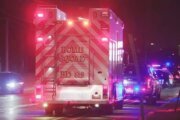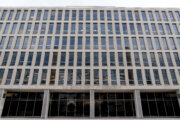ALLENBY CROSSING, West Bank (AP) — Three Israelis were shot and killed Sunday at the border crossing between the West Bank and Jordan, Israeli officials said, in what appeared to be an attack linked to the 11-month-old war in Gaza.
Israel’s military said the gunman approached the Allenby Bridge Crossing from the Jordanian side in a truck and opened fire at Israeli security forces, who killed him in a shootout. Israel’s Magen David Adom rescue service said the three Israelis were men in their 50s and the military said they were civilians.
Relatives identified the gunman as Maher al-Jazi, a retired Jordanian soldier from Athroh, a town in the impoverished Maan area. Jordan’s state-run Petra News Agency said he was transporting goods to the West Bank. The interior ministry said that, based on initial investigation results, the incident was an individual act.
Jordan was investigating. The Western-allied Arab country made peace with Israel in 1994 but is deeply critical of its policies toward the Palestinians. Jordan has a large Palestinian population and has seen mass protests against Israel over the war in Gaza.
Hundreds of Jordanians marched in Amman to celebrate the attack, chanting slogans in support of al-Jazi and burning the Israeli flag. “We bless this heroic operation carried out by this noble Jordanian hero,” said Murad Adaileh, head of the local Muslim Brotherhood Party.
The Allenby crossing over the Jordan River, also known as the King Hussein Bridge, is mainly used by Palestinians and tourists. The crossing has seen few security incidents, but in 2014 Israeli security guards shot and killed a Jordanian judge who they said had attacked them.
The crossing was closed, and Israel announced the closure of its land crossings with Jordan. It later said all would reopen on Monday.
Israeli Prime Minister Benjamin Netanyahu condemned the attack and linked it to Israel’s larger conflict with Iran and allied militant groups, including Hamas in Gaza and Hezbollah in Lebanon.
The Israeli-occupied West Bank has seen a surge of violence since Hamas’ Oct. 7 attack out of Gaza triggered the war there. Israel has launched near-daily military arrest raids into dense Palestinian residential areas, and there has been a rise in Israeli settler violence and Palestinian attacks on Israelis.
Loved ones mourned Aysenur Ezgi Eygi, an American-Turkish woman shot dead on Friday in the West Bank. She had been demonstrating against Israeli settlements. The White House has said it was “deeply disturbed,” while her family seeks an independent investigation. Her body remained at a hospital in Nablus.
In Gaza, an Israeli airstrike killed five people, including two women, two children and a senior official in the Civil Defense — first responders who operate under the Hamas-run government. The Civil Defense said the strike targeted the home of its deputy director for northern Gaza, Mohammed Morsi, in the urban Jabaliya refugee camp.
There was no immediate comment from the Israeli military. The army says it tries to avoid harming civilians and only targets militants.
Another Israeli strike hit the Eid family home in the Nuseirat refugee camp and killed at least two girls, according to an Associated Press journalist who counted the bodies and witnesses.
Paltel, one of the territory’s main telecom providers, said all household internet in central and southern Gaza was down because of ongoing attacks.
Gaza’s Health Ministry says over 40,000 Palestinians have been killed in Gaza since the war began. It does not differentiate between fighters and civilians in its count. The war has caused vast destruction and displaced around 90% of Gaza’s population of 2.3 million, often multiple times.
Hamas-led militants killed some 1,200 people, mostly civilians, in their Oct. 7 attack. They abducted another 250 and are still holding around 100 after releasing most of the rest in exchange for Palestinians imprisoned by Israel during a weeklong cease-fire last November. Around a third of the remaining hostages are believed to be dead.
The United States, Qatar and Egypt have spent months trying to broker a cease-fire and the return of the hostages, but the negotiations have repeatedly bogged down.
Also on Sunday, Netanyahu said government ministers may no longer visit Jerusalem’s most sensitive holy site — revered by Jews as the Temple Mount and by Muslims as Haram al-Sharif — without his permission. Israel’s far-right national security minister, Itamar Ben-Gvir, visited it again in July and has called for allowing Jewish prayer there. Tensions over the compound have fueled past violence.
Israel captured the West Bank, Gaza and east Jerusalem — territories the Palestinians want for a future state — in the 1967 Mideast war. Israel withdrew soldiers and settlers from Gaza in 2005 but maintained control over its airspace, coastline and most of its land crossings. Along with Egypt, it imposed a blockade on Gaza after Hamas seized power from rival Palestinian forces in 2007.
___
Melzer reported from Tel Aviv, Israel. Associated Press writers Samy Magdy in Cairo; Wafaa Shurafa in Deir al-Balah, Gaza Strip; Omar Akour in Amman, Jordan; and Melanie Lidman in Jerusalem contributed to this report.
___
Follow AP’s war coverage at https://apnews.com/hub/israel-hamas-war
Copyright © 2025 The Associated Press. All rights reserved. This material may not be published, broadcast, written or redistributed.







